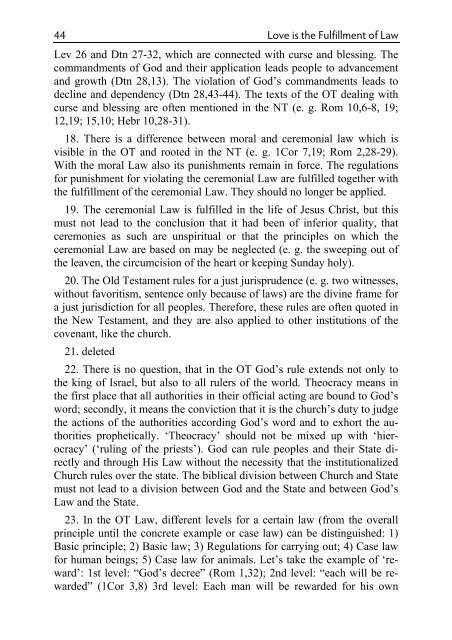Love is the Fulfillment of Law - World Evangelical Alliance
Love is the Fulfillment of Law - World Evangelical Alliance
Love is the Fulfillment of Law - World Evangelical Alliance
You also want an ePaper? Increase the reach of your titles
YUMPU automatically turns print PDFs into web optimized ePapers that Google loves.
44 <strong>Love</strong> <strong>is</strong> <strong>the</strong> <strong>Fulfillment</strong> <strong>of</strong> <strong>Law</strong><br />
Lev 26 and Dtn 27-32, which are connected with curse and blessing. The<br />
commandments <strong>of</strong> God and <strong>the</strong>ir application leads people to advancement<br />
and growth (Dtn 28,13). The violation <strong>of</strong> God’s commandments leads to<br />
decline and dependency (Dtn 28,43-44). The texts <strong>of</strong> <strong>the</strong> OT dealing with<br />
curse and blessing are <strong>of</strong>ten mentioned in <strong>the</strong> NT (e. g. Rom 10,6-8, 19;<br />
12,19; 15,10; Hebr 10,28-31).<br />
18. There <strong>is</strong> a difference between moral and ceremonial law which <strong>is</strong><br />
v<strong>is</strong>ible in <strong>the</strong> OT and rooted in <strong>the</strong> NT (e. g. 1Cor 7,19; Rom 2,28-29).<br />
With <strong>the</strong> moral <strong>Law</strong> also its pun<strong>is</strong>hments remain in force. The regulations<br />
for pun<strong>is</strong>hment for violating <strong>the</strong> ceremonial <strong>Law</strong> are fulfilled toge<strong>the</strong>r with<br />
<strong>the</strong> fulfillment <strong>of</strong> <strong>the</strong> ceremonial <strong>Law</strong>. They should no longer be applied.<br />
19. The ceremonial <strong>Law</strong> <strong>is</strong> fulfilled in <strong>the</strong> life <strong>of</strong> Jesus Chr<strong>is</strong>t, but th<strong>is</strong><br />
must not lead to <strong>the</strong> conclusion that it had been <strong>of</strong> inferior quality, that<br />
ceremonies as such are unspiritual or that <strong>the</strong> principles on which <strong>the</strong><br />
ceremonial <strong>Law</strong> are based on may be neglected (e. g. <strong>the</strong> sweeping out <strong>of</strong><br />
<strong>the</strong> leaven, <strong>the</strong> circumc<strong>is</strong>ion <strong>of</strong> <strong>the</strong> heart or keeping Sunday holy).<br />
20. The Old Testament rules for a just jur<strong>is</strong>prudence (e. g. two witnesses,<br />
without favorit<strong>is</strong>m, sentence only because <strong>of</strong> laws) are <strong>the</strong> divine frame for<br />
a just jur<strong>is</strong>diction for all peoples. Therefore, <strong>the</strong>se rules are <strong>of</strong>ten quoted in<br />
<strong>the</strong> New Testament, and <strong>the</strong>y are also applied to o<strong>the</strong>r institutions <strong>of</strong> <strong>the</strong><br />
covenant, like <strong>the</strong> church.<br />
21. deleted<br />
22. There <strong>is</strong> no question, that in <strong>the</strong> OT God’s rule extends not only to<br />
<strong>the</strong> king <strong>of</strong> Israel, but also to all rulers <strong>of</strong> <strong>the</strong> world. Theocracy means in<br />
<strong>the</strong> first place that all authorities in <strong>the</strong>ir <strong>of</strong>ficial acting are bound to God’s<br />
word; secondly, it means <strong>the</strong> conviction that it <strong>is</strong> <strong>the</strong> church’s duty to judge<br />
<strong>the</strong> actions <strong>of</strong> <strong>the</strong> authorities according God’s word and to exhort <strong>the</strong> authorities<br />
prophetically. ‘Theocracy’ should not be mixed up with ‘hierocracy’<br />
(‘ruling <strong>of</strong> <strong>the</strong> priests’). God can rule peoples and <strong>the</strong>ir State directly<br />
and through H<strong>is</strong> <strong>Law</strong> without <strong>the</strong> necessity that <strong>the</strong> institutionalized<br />
Church rules over <strong>the</strong> state. The biblical div<strong>is</strong>ion between Church and State<br />
must not lead to a div<strong>is</strong>ion between God and <strong>the</strong> State and between God’s<br />
<strong>Law</strong> and <strong>the</strong> State.<br />
23. In <strong>the</strong> OT <strong>Law</strong>, different levels for a certain law (from <strong>the</strong> overall<br />
principle until <strong>the</strong> concrete example or case law) can be d<strong>is</strong>tingu<strong>is</strong>hed: 1)<br />
Basic principle; 2) Basic law; 3) Regulations for carrying out; 4) Case law<br />
for human beings; 5) Case law for animals. Let’s take <strong>the</strong> example <strong>of</strong> ‘reward’:<br />
1st level: “God’s decree” (Rom 1,32); 2nd level: “each will be rewarded”<br />
(1Cor 3,8) 3rd level: Each man will be rewarded for h<strong>is</strong> own

















